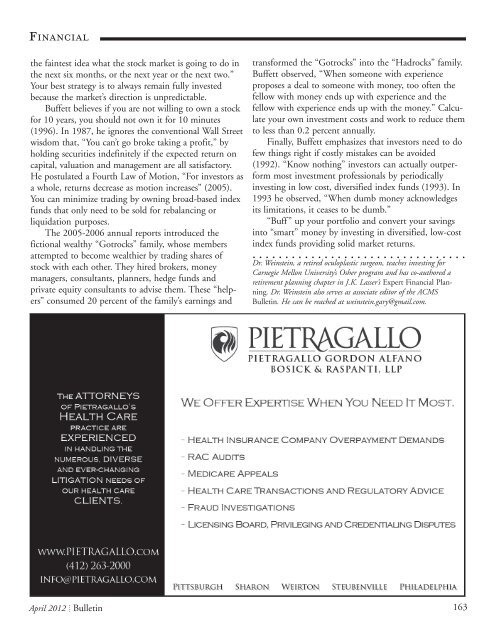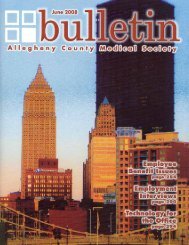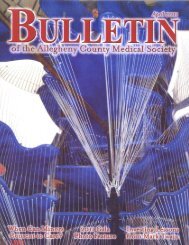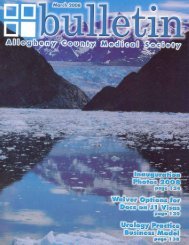Download - Allegheny County Medical Society
Download - Allegheny County Medical Society
Download - Allegheny County Medical Society
You also want an ePaper? Increase the reach of your titles
YUMPU automatically turns print PDFs into web optimized ePapers that Google loves.
FINANCIAL<br />
the faintest idea what the stock market is going to do in<br />
the next six months, or the next year or the next two.”<br />
Your best strategy is to always remain fully invested<br />
because the market’s direction is unpredictable.<br />
Buffett believes if you are not willing to own a stock<br />
for 10 years, you should not own it for 10 minutes<br />
(1996). In 1987, he ignores the conventional Wall Street<br />
wisdom that, “You can’t go broke taking a profit,” by<br />
holding securities indefinitely if the expected return on<br />
capital, valuation and management are all satisfactory.<br />
He postulated a Fourth Law of Motion, “For investors as<br />
a whole, returns decrease as motion increases” (2005).<br />
You can minimize trading by owning broad-based index<br />
funds that only need to be sold for rebalancing or<br />
liquidation purposes.<br />
The 2005-2006 annual reports introduced the<br />
fictional wealthy “Gotrocks” family, whose members<br />
attempted to become wealthier by trading shares of<br />
stock with each other. They hired brokers, money<br />
managers, consultants, planners, hedge funds and<br />
private equity consultants to advise them. These “helpers”<br />
consumed 20 percent of the family’s earnings and<br />
transformed the “Gotrocks” into the “Hadrocks” family.<br />
Buffett observed, “When someone with experience<br />
proposes a deal to someone with money, too often the<br />
fellow with money ends up with experience and the<br />
fellow with experience ends up with the money.” Calculate<br />
your own investment costs and work to reduce them<br />
to less than 0.2 percent annually.<br />
Finally, Buffett emphasizes that investors need to do<br />
few things right if costly mistakes can be avoided<br />
(1992). “Know nothing” investors can actually outperform<br />
most investment professionals by periodically<br />
investing in low cost, diversified index funds (1993). In<br />
1993 he observed, “When dumb money acknowledges<br />
its limitations, it ceases to be dumb.”<br />
“Buff” up your portfolio and convert your savings<br />
into “smart” money by investing in diversified, low-cost<br />
index funds providing solid market returns.<br />
○ ○ ○ ○ ○ ○ ○ ○ ○ ○ ○ ○ ○ ○ ○ ○ ○ ○ ○ ○ ○ ○ ○ ○ ○ ○ ○ ○ ○ ○ ○ ○<br />
○<br />
Dr. Weinstein, a retired oculoplastic surgeon, teaches investing for<br />
Carnegie Mellon University’s Osher program and has co-authored a<br />
retirement planning chapter in J.K. Lasser’s Expert Financial Planning.<br />
Dr. Weinstein also serves as associate editor of the ACMS<br />
Bulletin. He can be reached at weinstein.gary@gmail.com.<br />
April 2012 : Bulletin<br />
163
















